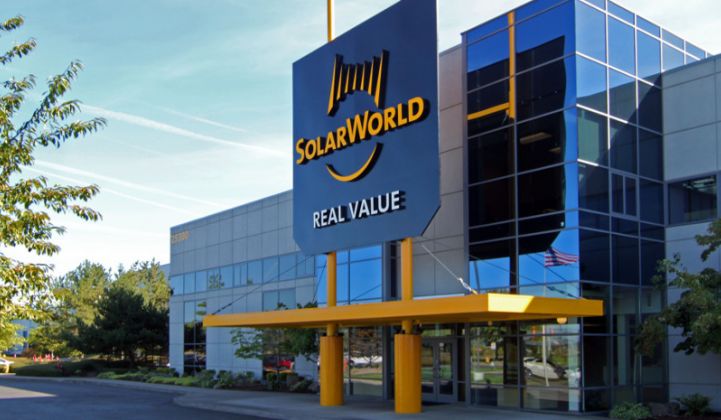SolarWorld Americas has secured a lifeline.
The financially troubled solar manufacturer announced yesterday that lenders have agreed to immediately forward $6 million in cash, which will allow the firm to stabilize operations and fight a high-stakes U.S. solar trade dispute.
Lenders will also permit the Hillsboro, Ore.-based company to sell any assets not required for operations, including a warehouse and land next to its factory, and put the proceeds back into the business. SolarWorld leadership expects these sales, coupled with the $6 million, to result in a combined cash infusion in the "double-digit-million-dollar range."
“This financial reinforcement is good for our customers and suppliers alike,” said Juergen Stein, president of SolarWorld Americas, in a statement. “It means quite simply that we can reassure our business partners that we will remain a reliable force not only in supplying leading solar technology but also in continuing to fight for fair trade in the U.S. market and improving market conditions there.”
The deal comes shortly after the U.S. solar manufacturer eliminated 360 jobs. The restructuring was to be expected. SolarWorld warned its 800 employees in May that the company was facing mass layoffs after its Germany parent company filed for insolvency.
SolarWorld Americas notified Oregon employment officials that it expected to cut at least 500 jobs and possibly as many as 711, The Oregonian reported. "This employment action is expected to be permanent," according to a letter sent on May 19. Layoffs and other attrition have reportedly reduced the headcount from 800 to around 300.
The U.S. firm appears to be limping along at least, while its parent company, SolarWorld AG, and several sibling subsidiaries move through insolvency proceedings in Europe, which are akin to the U.S. bankruptcy process. A true recovery for SolarWorld, however, hinges on the outcome of a crucial trade ruling.
In May, as the company prepared to make steep job cuts, SolarWorld Americas joined with Suniva as co-petitioner in a Section 201 trade case. The case "seeks relief for the pioneering U.S. solar manufacturing industry from a deluge of imports that has heavily distorted the industry’s market," according to a SolarWorld statement.
SolarWorld previously led several trade cases against Chinese solar manufacturers for allegedly dumping solar modules in the U.S. and Europe. The U.S. Commerce Department set anti-subsidy rates on most Chinese solar imports in 2012, but Western manufacturers still struggle to compete on price. Stein claims China is "forcing competitors to take losses, lay off workers and exit the market" by managing to "circumvent and violate existing trade defense measures."
The U.S. International Trade Commission (ITC) officially accepted the trade petition in May, calling it "extraordinarily complicated." If approved, there would be a new minimum price on imported crystalline silicon solar modules and a new tariff on imported cells. In this case, SolarWorld would likely be able to ramp up production, but the decision could be enormously damaging to the broader solar market.
According to GTM Research, the decision would strike a devastating blow to most U.S. solar companies, erasing one-half of installations expected to come on-line through 2022. Put another way, the U.S. could miss out on more than 35 gigawatts of solar installations, which represents more than the U.S. solar market has brought on-line to date. Calculations were based on Suniva and SolarWorld's requested penalties for imported solar equipment ($0.40 per watt tariff for cells and a floor price of $0.78 per watt on modules).
The ITC is expected to rule on the case in September, and to propose a remedy in November. But the decision to impose penalties ultimately rests with President Donald Trump.
SunPower CEO Tom Werner wrote an op-ed in The Huffington Post this week, encouraging the Trump administration to reject solar tariffs. "America deserves better than putting ourselves at a competitive disadvantage in the rapidly growing solar power market," he wrote.
The U.S. solar industry currently employs around 260,000 people, fewer than 1,000 of which work for the two companies at the center of the ITC petition, Werner added.
This article was updated with GTM Research figures based on a $0.78 per watt floor price scenario.



